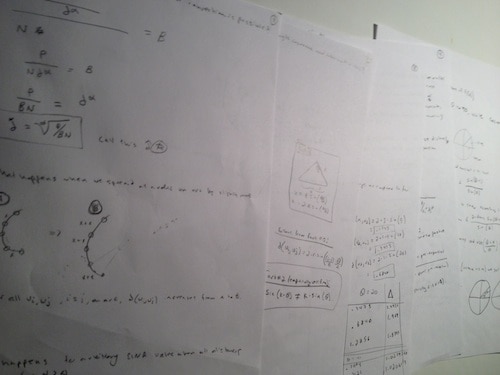A Useful Rejection
Earlier in my career, I submitted a grant proposal to a prestigious program. At the time, I had an interesting research idea bouncing around, so when I saw the deadline approach, I hunkered down for a week of deep work to pull together a submission.
A few months later, while at a workshop, I met the head of the funding program. I told her about my proposal.
“I assume,” she said, “that you had the very best people in your field read it over first.”
I had not.
Soon after this encounter, I received my rejection notification.
Evidence-Based Betting
Reflecting on this experience, I now notice that in my rush to embrace deep work and purposeful bets I had overlooked a more prosaic piece of the puzzle: learning the rules that govern the area where I was making my play.
If I had followed the program director’s advice and pumped experts for feedback, I would have learned about what you absolutely need for a fundable proposal. I avoided this step, I think, because some part of me didn’t want these answers. By writing my grant in isolation, I could ensure an optimal experience, where I had to put in focused hours, but never really challenge myself too much.
This was fulfilling. But it was also a recipe for failure.
I was like the amateur runner who spends her training days doing hard (but not too hard) three mile jogs instead of the brutal interval work she really needs to improve.
I don’t think we emphasize enough the importance of evidenced-based metrics. Deep work is important. Making lots of bets is important. But if these efforts are not grounded in the reality of your field — including the hard truths about what you really do need to potentially succeed, not just what you know how to do — they are wasted.


I think it comes down to feedback. The normal loop for improving a project is something like
Thought -> Create -> Get feedback -> Repeat
For something like Math, you can usually provide the feedback yourself-you can see what’s wrong with your work. In other words, you have good taste. For something like grant proposals, your taste is limited, so no matter how effectively you work on the loop by yourself you can never reach the level you would by asking someone with better taste than you to provide feedback.
Thank you for this reminder… it was what I needed to hear today…
This is part of grantsmanship. Even if you have sound hypotheses, there are ways that your ‘reviewers’ may want the aims flushed out. I disagree with only considering the viewpoint that one’s point of view is flawed or that you didn’t think the concepts through enough. It may not be a ‘evidence’ based metric, but an opinion biased metric that governs what gets funded or not. You just need to either accept it as an obstacle/cost of doing business or find a field that you can operate within.
“You have to learn the rules of the game. And then you have to play better than anyone else.”
~Albert Einstein
Nice post Cal. I enjoy hearing about how you bounce back from failures, because it reminds me that the entire Study Hacks philosophy is built around some type of feedback loop.
Your grant rejection reminds me of my undergrad application rejections. I got denied from a lot of top universities, because almost all my assumptions about high-school student impressiveness were incorrect. After I had made the common error of building a nice laundry list of activities that I thought would “wow” college admissions teams, I realized that all the applications sought depth in activities (rather than breadth). Had I sought feedback-based bets in trying to become distinguished in my high-school years, I would have had to leave my comfort zone and dig deep into one meaningful activity.
This begs the question you’ve asked once before: “Are You a Guitar Player or Club Owner?”
So yeah, run billions of interviews with the top people in that field. It’s one of the fastest ways to learn things and you get information that takes months if not years to percolate down to the publication level.
(ok maybe not billions… just millions) – you get my point hopefully.
Thanks,
Nick
Great lesson learned. I had a grant rejected because I used an 11 point font rather than the required 12 point. After that I measured the spacing to ensure conformity with requirements. But I would also add that you learned well from that submission. Sometimes you need to just go do it and know that you will learn from it.
Yeah this advice applies to every aspect of life, but for science i think is mandatory. I can think there are lots of areas where you need to know how the game like grant writing, article publication, experiment design etc, scholarships etc etc
Excellent point!
One thing that I’ve learned though is the importance of getting multiple sources of feedback, but then sorting through that information to determine what’s right for you.
You can’t make everyone happy so you need to pick out the nuggets of truth that best apply to your situation and discard the rest.
To your brilliance!
Elizabeth Grace Saunders
Cal giving a talk at Google …https://www.youtube.com/watch?v=qwOdU02SE0w
This reminds of an old Chinese saying by Sunzi in Art of War, nothing comes first than “know your enemy”.
Cal, I found the movie ” Jiro Dreams Of Sushi ” and it keeps me reminding me of Study Hacks and the stuff that you preach 🙂 Do check the movie out.
Valuable post. Too often in today’s Google world, we assume we know all there is to know about a subject. Most of the time, that is wrong. We don’t know what we don’t know. By soliciting outside feedback, acknowledge our limited knowledge we can improve and get done what we want to get done.